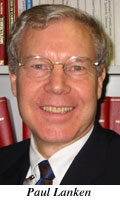
|
Paul Lanken: Associate Dean for Professionalism and Humanism
Dr. Paul N. Lanken, professor of medicine and medical ethics and senior fellow at the Center for Bioethics at the School of Medicine, has been appointed Associate Dean for Professionalism and Humanism. The position has oversight for the courses and classes related to professionalism and humanism that span the four years of medical education. These educational components comprise Module 6—Professionalism and Humanism—of Curriculum 2000. Implemented in 1998 at Penn's School of Medicine, Curriculum 2000 represents a major restructuring of the four years of medical student education that is designed to educate physicians who can successfully meet the challenges of medicine in the 21st century. Dr. Lanken will also be responsible for starting and directing a chapter of the Gold Humanism Honor Society, sponsored by the Arnold P. Gold Foundation, a public foundation fostering humanism in medicine. "This is a great opportunity to continue the innovative and groundbreaking work that permits Penn to provide a comprehensive, quality medical education to its students," says Dr. Lanken, of his appointment. "By creating this new position, Penn Medicine has clearly demonstrated the medical school's strong commitment to education in professionalism and humanism." Since the start of Curriculum 2000, Dr. Lanken has served as the Module 6 leader. Earlier this year he was responsible for directing the start of Penn Medicine's Doctoring Longitudinal Patient-Centered Experience (DLPCE). This innovative teaching strategy helps students gain first-hand experience in an ongoing relationship with a patient. DLPCE partners a pair of first-year medical students with a patient who has a chronic health condition. The students follow their assigned patient over the next three years under the guidance of the patient's physician and faculty preceptor in the three-year long Doctoring Course, a keystone in Module 6. The medical students will learn how the patient's health condition affects their physical and emotional well-being, their family, and how patients cope with both illness and problems encountered in the health care systems, such as paying for their medications. This "patient-centered learning" aims to help these doctors-to-be learn about illnesses and diseases from the patient's point of view. The experience will focus on events and relationships in the patient's world, while they battle a chronic illness. "It aims to help students learn to view their patients as persons, which in the long run, will help them be better doctors," adds Dr. Lanken. Dr. Lanken has been an attending physician in the Pulmonary, Allergy and Critical Care Division of the Department of Medicine since 1978. He is board certified in Internal Medicine, Pulmonary Diseases and Critical Care Medicine. He previously served as Medical Director of the Medical Intensive Care Unit and Medical Director of the Department of Respiratory Care Services at HUP. His clinical research interests are numerous and he specializes in randomized clinical trials involving intensive care patients with sepsis or the acute respiratory distress syndrome (ARDS). He also is currently the recipient of a STEP (Strategies for Teaching and Evaluating Professionalism) grant from the American Medical Association in support of further development of teaching and evaluation of professionalism in medical education. As a Senior Fellow in the Center for Bioethics and Professor in the Department of Medical Ethics in the School of Medicine, Dr. Lanken is particularly interested in areas of bioethics relevant to intensive care situations, such as withholding and withdrawing life support, informed consent of critically ill patients, and the allocation of scarce and expensive resources. As Module 6 leader, he is the lead course director for four courses in medical ethics and professionalism that form an integrated curriculum throughout the four years of medical school. Dr. Lanken's tireless efforts to create a robust and innovative humanism and professionalism curriculum have played a key role in the success of Curriculum 2000 and in promoting professional values and better bedside manners of hundreds of Penn Medicine students.
|
|
